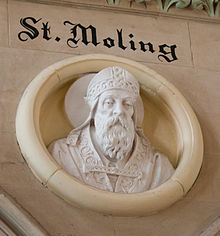Mo Ling
Appearance
(Redirected from Saint Moling)
Saint Mo Ling | |
|---|---|
 Relief of St. Mo Ling in the parish church of St Mary and St Michael in New Ross | |
| Born | 614 Sliabh Luachra, County Kerry |
| Died | 697 |
| Feast | 17 June |
Saint Mo Ling (614–697), also named Moling Luachra,[1] was the second Bishop of Ferns in Ireland and has been said to be "one of the four great prophets of Erin".[2] He founded a monastery at St Mullin's, County Carlow. His feast day is 17 June.[3][4] Traditions about him are preserved in two manuscripts, The Birth and Life of St. Moling, and the Borama, both of which expound on how he ended a cattle tributary imposed by the kings of Tara on the kings of Leighin, in retribution for an incident when the son of the king of Leighin went on a cattle raid to Clonfert, killing several princesses in the act.[5]

See also
[edit]References
[edit]- ^ Ó Riain, Pádraig (2011). A Dictionary of Irish Saints. Four Courts Press. pp. 487–490. ISBN 978-1-84682-318-3.
- ^ Healy, John (1912). "Chapter XVIII: The School of Glendalough". Insula Sanctorum et Doctorum Or, Ireland's Ancient Schools and Scholars (6 ed.). Dublin/London/New York: Sealy, Bryers & Walker/Burns & Oates/Benziger Brothers. p. 429. Retrieved 19 August 2014.
- ^ "St Myllin's Church, Llanfyllin". Mathrafal Deanery. Retrieved 19 April 2015.
- ^ A Compendium of Irish Biography
- ^ Ghosh, Shubha (30 October 2020). Forgotten Intellectual Property Lore: Creativity, Entrepreneurship and Intellectual Property. Edward Elgar Publishing. p. 120. ISBN 978-1-78897-871-2.
External links
[edit]Wikimedia Commons has media related to Saint Moling.
- Saint Moling et le Lépreux, a story about Mo Ling and a leper, edited from UCD Franciscan Manuscript A9 and translated into French by Paul Grosjean S.J. at Thesaurus Linguae Hibernicae
Further reading
[edit]- Johnston, Elva (2004), "Mo Ling (d. 697)", Oxford Dictionary of National Biography (Online ed.), Oxford University Press, retrieved 16 February 2011
- Stephen, Leslie, ed. (1888). . Dictionary of National Biography. Vol. 13. London: Smith, Elder & Co.
- . New International Encyclopedia. 1905.
